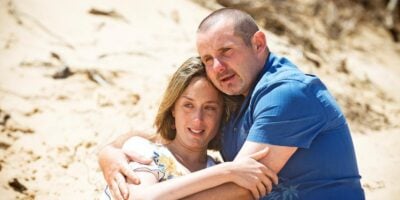When I speak to choreographer Stephen Page, it’s a matter of hours until Bangarra Dance Theatre’s newest show Blak opens at the Sydney Opera House. He should rightfully be stressed out, but instead, he’s over the moon following a very successful preview performance the night before.
“We had a Koori Night last night, which is basically a community night,” he explains. “We bring a whole lot of people together from around Sydney – people who wouldn’t normally get to experience something like this, or even go to a performance at the Opera House. It’s a great, fun thing to do for everybody – a great initiation for the cast before the mainstream audience on opening night.”
Blak tells stories of indigenous Australia from an urban perspective, and Page says that he was thrilled by the community’s response. “It’s a totally different kind of performance,” he says, “because the audience know the dancers, they know where their families are from, so there are really close connections.” It was less a dance performance, he says, than a rock concert. “The audience was making noise all through the performances,” he continues. “There was a lot of support. When it comes to opening night, there are reviewers there … the dancers are aware of being judged. The energy on a community night is totally different. Hopefully the dancers can incorporate some of that into their future performances.”
The show is split into three parts, entitled Scar, Yearning and Keepers. Each deals with the urban experience in a different way – Scar features the men of the Bangarra Dance Theatre, Yearning features the women, and Keepers brings them all together. Dancer Daniel Riley McKinley choreographed Scar himself. “This will be Daniel’s second work for the company,” Page explains. “He’s interested in posing questions about what it is to be a man, when you know you’re a man. He’s inspired by traditional aboriginal men’s business, and how initiation customs still happen in some rural communities – he’s exploring what those ideas mean to urban boys who were brought up without traditional language and customs.”
The final section of the show, Keepers, was jointly choreographed by Page and McKinley, and it proved to be a rich collaboration for the pair. “For that one, we talked about how we wanted to pay respect to our elders,” Page explains. “We wanted Keepers to be one big ceremony, and we talked about stories from up in Arnhem Land.” They talked, he says, about traditional processes – about how the land shapes the people, the people shape the language, the language shaped the songs that move people to dance. “It was really organic,” he says. “We had no script or anything like that – it was all based on heart and spirit.”
Page has been artistic director of Bangarra for more than 20 years now, and I ask what exactly has kept him vital and engaged in the process this whole time. “What keeps me excited is seeing the generations coming through, hungry for knowledge and hungry for culture,” he explains. “They want to learn and then express it through dance theatre. The medium of dance allows us to connect with our culture, and I love to be able to pass that on to future generations. I’m an urban guy, but I’m able to go back to the country and learn and hear stories from elders who trust me and the company, the urban clan, with their stories. I’m really proud of that, and that drives me. The continuation of traditions through dance keeps me excited, and the ability to connect new generations to the past.”
BY ALASDAIR DUNCAN
What: Bangarra Dance Theatre’s Blak
Where: Sydney Opera House
When: Until June 22
More: bangarra.com.au
Bangarra Dance Theatre perform Blak at the Sydney Opera House until June 29. Visit bangarra.com.au for more information.


































